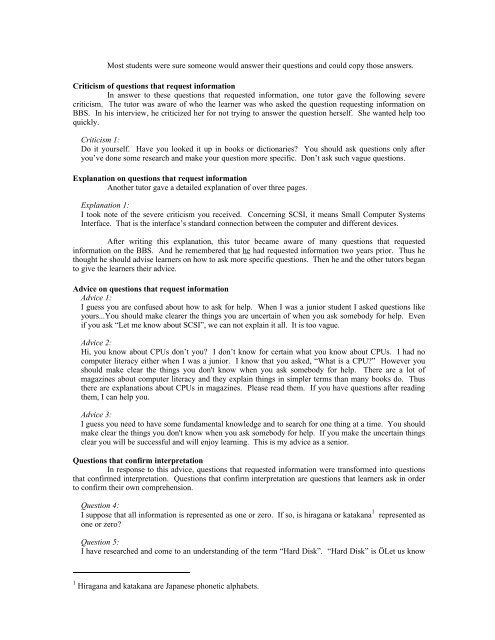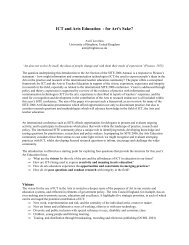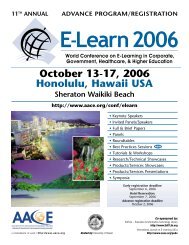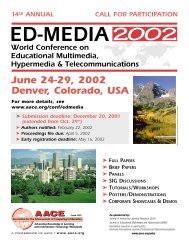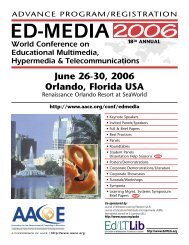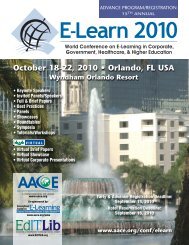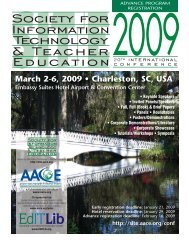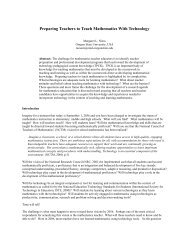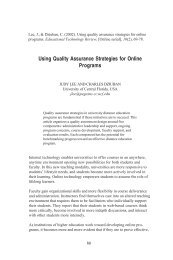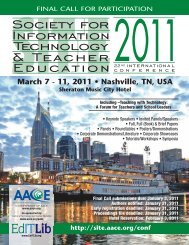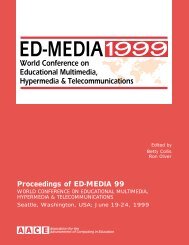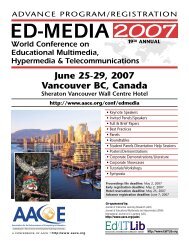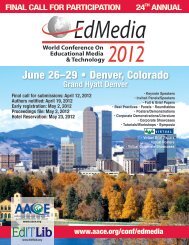ED-MEDIA 1999 Proceedings Book - Association for the ...
ED-MEDIA 1999 Proceedings Book - Association for the ...
ED-MEDIA 1999 Proceedings Book - Association for the ...
Create successful ePaper yourself
Turn your PDF publications into a flip-book with our unique Google optimized e-Paper software.
Most students were sure someone would answer <strong>the</strong>ir questions and could copy those answers.<br />
Criticism of questions that request in<strong>for</strong>mation<br />
In answer to <strong>the</strong>se questions that requested in<strong>for</strong>mation, one tutor gave <strong>the</strong> following severe<br />
criticism. The tutor was aware of who <strong>the</strong> learner was who asked <strong>the</strong> question requesting in<strong>for</strong>mation on<br />
BBS. In his interview, he criticized her <strong>for</strong> not trying to answer <strong>the</strong> question herself. She wanted help too<br />
quickly.<br />
Criticism 1:<br />
Do it yourself. Have you looked it up in books or dictionaries You should ask questions only after<br />
you’ve done some research and make your question more specific. Don’t ask such vague questions.<br />
Explanation on questions that request in<strong>for</strong>mation<br />
Ano<strong>the</strong>r tutor gave a detailed explanation of over three pages.<br />
Explanation 1:<br />
I took note of <strong>the</strong> severe criticism you received. Concerning SCSI, it means Small Computer Systems<br />
Interface. That is <strong>the</strong> interface’s standard connection between <strong>the</strong> computer and different devices.<br />
After writing this explanation, this tutor became aware of many questions that requested<br />
in<strong>for</strong>mation on <strong>the</strong> BBS. And he remembered that he had requested in<strong>for</strong>mation two years prior. Thus he<br />
thought he should advise learners on how to ask more specific questions. Then he and <strong>the</strong> o<strong>the</strong>r tutors began<br />
to give <strong>the</strong> learners <strong>the</strong>ir advice.<br />
Advice on questions that request in<strong>for</strong>mation<br />
Advice 1:<br />
I guess you are confused about how to ask <strong>for</strong> help. When I was a junior student I asked questions like<br />
yours...You should make clearer <strong>the</strong> things you are uncertain of when you ask somebody <strong>for</strong> help. Even<br />
if you ask “Let me know about SCSI”, we can not explain it all. It is too vague.<br />
Advice 2:<br />
Hi, you know about CPUs don’t you I don’t know <strong>for</strong> certain what you know about CPUs. I had no<br />
computer literacy ei<strong>the</strong>r when I was a junior. I know that you asked, “What is a CPU” However you<br />
should make clear <strong>the</strong> things you don't know when you ask somebody <strong>for</strong> help. There are a lot of<br />
magazines about computer literacy and <strong>the</strong>y explain things in simpler terms than many books do. Thus<br />
<strong>the</strong>re are explanations about CPUs in magazines. Please read <strong>the</strong>m. If you have questions after reading<br />
<strong>the</strong>m, I can help you.<br />
Advice 3:<br />
I guess you need to have some fundamental knowledge and to search <strong>for</strong> one thing at a time. You should<br />
make clear <strong>the</strong> things you don't know when you ask somebody <strong>for</strong> help. If you make <strong>the</strong> uncertain things<br />
clear you will be successful and will enjoy learning. This is my advice as a senior.<br />
Questions that confirm interpretation<br />
In response to this advice, questions that requested in<strong>for</strong>mation were trans<strong>for</strong>med into questions<br />
that confirmed interpretation. Questions that confirm interpretation are questions that learners ask in order<br />
to confirm <strong>the</strong>ir own comprehension.<br />
Question 4:<br />
I suppose that all in<strong>for</strong>mation is represented as one or zero. If so, is hiragana or katakana 1<br />
one or zero<br />
represented as<br />
Question 5:<br />
I have researched and come to an understanding of <strong>the</strong> term “Hard Disk”. “Hard Disk” is ÖLet us know<br />
1 Hiragana and katakana are Japanese phonetic alphabets.


